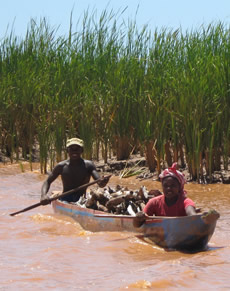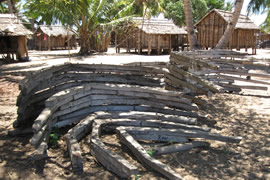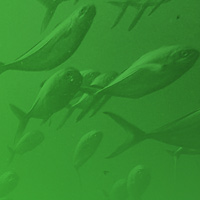
Madagascar’s lush mangrove forests are crucial to protecting the island nation’s wildly biodiverse but fragile ecosystem and sustaining the Malagasy people who have fished and farmed on these coasts for centuries. But as a recent MacArthur-funded study documented, climate change has had a devastating effect on the mangroves. Sea level rise swamps them from one side, while erosion and freshwater run-off caused by increasing storms harm them from the other.
More than half the world’s mangroves have been lost in the last half century. Madagascar’s 332,000 hectares of mangrove, mostly on the western coast, have already been significantly degraded, and their loss will likely continue and even accelerate.
Mangroves form an important buffer against the storm surges that are expected to increase greatly with climate change. And they provide habitat for fish and crabs which give the Malagasy nutrition and a modest income. Nearly every facet of coastal Malagasy life is tied to the mangroves — they also burn the mangrove wood for heat and light and sell it in inland towns. Mangroves are a staple of the country’s charcoal industry, with increased harvesting following deregulation of the industry during the 2009 coup.

Alison Clausen, Climate Change Programme officer for the World Wildlife Fund (WWF), explains the mangroves suffer from a direct and indirect “double exposure” to climate change. As drought and storms reduce local communities’ agricultural production, and ocean acidification and coral bleaching degrade fisheries, people harvest even more mangroves to compensate. Meanwhile the mangroves themselves are suffering from climate change and can hardly afford the extra harvesting.
“It becomes a vicious circle,” Clausen says.
Understanding the dire ecological effects of climate change on biodiverse ecosystems like Madagascar’s mangrove forests can play an important role in advocating for policy and industry changes to curb greenhouse gas emissions and mitigate climate change. But complete mitigation is impossible. So the MacArthur Foundation is also funding groups on the ground, including the WWF, to help Malagasy communities adapt to inevitable changes and to reduce other stresses on the mangroves so they can better survive a changing climate.
An important aspect of this work is raising awareness among locals. Rivo Rabarisoa, a staffer with the MacArthur-funded group Asity Madagascar, notes that many residents don’t realize how bad things are — “they see the mangroves as always green and productive.”
Convincing locals to reduce their harvesting of mangroves will help compensate for the effects of climate change. NGOs can do this by distributing efficient stoves and lanterns to replace mangrove-burning, and by introducing agricultural innovations like drought-resistant rice that bolster farming income. Increasing literacy and education gives residents more opportunities, as does fostering ecotourism and helping fishermen form trade associations to demand better prices for their catch. All this means less mangrove harvesting, and a direct community investment in protecting a valuable natural resource.
“People are generally receptive and become actively involved in these projects,” says Clausen, “When we listen to them and use traditional knowledge to build climate change adaptation strategies.”




